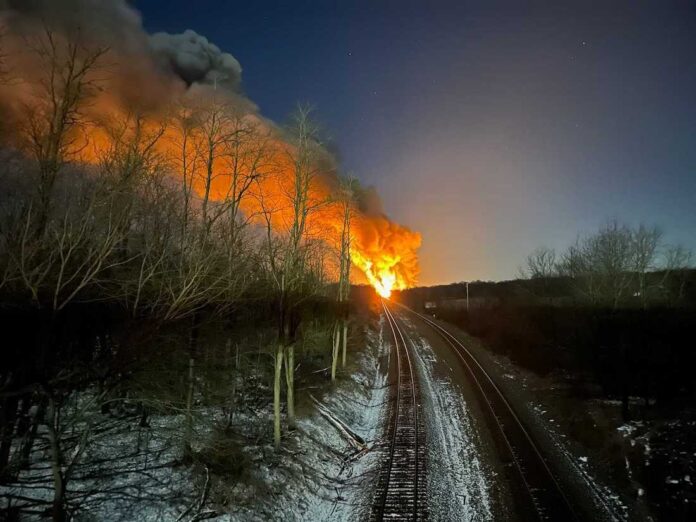
It’s not often your community turns into a national news story. But that’s what happened to my hometown last February. I live in Darlington Township, Pennsylvania, a small town right on the state line with Ohio.
East Palestine, Ohio has always felt like a sister city, one with more stuff than we had in rural Darlington. EP had a nice public library, a pool and a big community park, in addition to a grocery store, a couple hardware stores and an auto parts store. They also have a Pizza Joe’s franchise owned by one of the nicest guys ever.
East Palestine has cheaper gas than we have in Pennsylvania. And before our commonwealth loosened up its liquor laws, it was the closest place you could buy alcohol after 9 p.m. and in amounts less than an entire case. This last part used to be important to me as a young adult for reasons I will not elaborate on.
This is all to say that when a train derailed and caught fire there last year, it hit close to home in all senses of the phrase.
I found out about the derailment Friday night, shortly after it happened. My sister and brother-in-law drove out to check it out. I would have gone to take a look, too, but I was stuck at home with my sleeping children. I know it sounds crazy, to seek out a catastrophe, but it’s what you do, right? You have to look. Not necessarily to gawk, but to confirm with your own eyes that this unbelievable thing is happening.
Over the weekend, it seemed like the situation was under control. Or as under control as a massive train derailment and fire involving hazardous chemicals can be.
On Monday morning, it became clear that things were not under control. The state shut down the four-lane state highway in front of our farm without notice. We weren’t given the order to evacuate, but we would find out in the afternoon that we were in the path of what was going to be a noxious cloud of smog from the “controlled” vent and burn of vinyl chloride from some of the derailed train cars. The alternative, authorities said, was to let the train cars possibly explode on their own, blowing shrapnel and chemicals in all directions.
With no way to move our animals safely, we hunkered down. We brought our farm dogs inside, closed all the windows tight and limited our exposure to the outside world as the darkness descended on Darlington.
Later, the U.S. EPA would determine that our farm was in the “deposition area” from the controlled burn. That means soot particles from the burn most likely landed in our fields.
All of our outside animals survived. Even the 2-week-old lambs I had just let out of the barn the day before the chemical burn-off. We had soil and plant tissue tested from hay fields. Everything came back normal (surprisingly so, considering some of those fields are former strip mine ground).
While it was a stressful week, and a stressful couple of months afterward as we figured out what had happened to our farm and got the resources we needed, it was a one-off bad event.
Things are mostly back to normal now, at least where I’m at. I think many people in Darlington would agree. The situation is different for people living in East Palestine, but it seems many of them would like to move on, too. But not everyone.
For some people, this has been a life-altering event. Things will never be the same. Some people experienced health issues that environmental tests and government agencies can not explain. Some people are living with trauma from an event that made them lose the feeling of safety in their home. How do you get that back?
This has been difficult for me to reconcile. I am and have been living this news event, too, and my experience does not line up with a lot of what I’m seeing reported. We didn’t have any unexplained animal deaths. The wildlife is still flourishing on our farm. I have probably exposed myself to worse air quality by regularly running old diesel-fueled equipment or lighting off our burn pile. Life on the farm goes on, for better or worse.
But life has not gone on for everyone. As a journalist, and as a compassionate person in general, you have to believe people’s lived experiences. How can you argue with what another person experienced? That’s what we report on. That’s what makes stories interesting — the human elements of them.
It’s normal to think that your experience is the truth. It’s a fact because you lived it. You know it happened that way. But someone else can experience that same thing quite differently. It doesn’t mean someone is right and someone is wrong. There are at least two sides to every story. We owe it to our fellow humans to listen to both.
(Rachel Wagoner is the editor of Farm and Dairy. She welcomes feedback at rachel@farmanddairy.com or 724-201-1544.)
Related content
One year later: Environmental concerns remain after East Palestine derailment
One year later: little change in railway safety after East Palestine derailment












